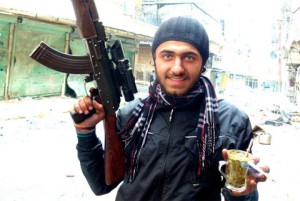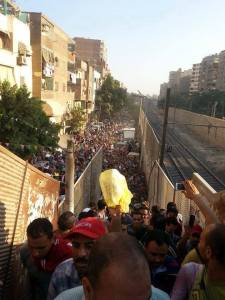I edited the Critical Muslim’s Syria issue, which includes excellent essays by Amal Hanano, Rasha Omran, Itab Azzam, Maysaloon, Malu Halasa, poetry by Golan Hajji, prose from Zakkariya Tamer, and much more. I contributed an essay on Syrian culture revolutionised, and I wrote the following list:
 In the old days Syrians were ready to list their ten favourite picnic spots, their ten favourite restaurants, or even ten of the sects participating in the imaginary happy mosaic. Today lists of traumatisation leap to the mind: the ten largest refugee camps, or ten major massacres, or perhaps ten of the numerous new militias.
In the old days Syrians were ready to list their ten favourite picnic spots, their ten favourite restaurants, or even ten of the sects participating in the imaginary happy mosaic. Today lists of traumatisation leap to the mind: the ten largest refugee camps, or ten major massacres, or perhaps ten of the numerous new militias.
This list tends towards the positive (only number 10 is a bad thing – it’s something that can’t be ignored). It focusses on those aspects of Syrian reality that can’t be destroyed by war, those things which will survive (with the exception, we hope, of number 10).
1. Maté
Along with Turkish Coffee, Argentinian Yerba Maté is Syria’s quintessential drink. Drink it strong and sugary in a gourd or a glass, through a silver straw from the Qalamoun region; keep the water hot for continual fill-ups; and you’ll be telling Homsi and muhashish jokes all night. Maté connotes conviviality, and sometimes more specifically the Druze, Christian and Alawi mountain communities. When the martyred Free Army commander Abu Furat appealed to the Alawi community, he did so in terms every Syrian would understand: “I know the Alawis well. I’ve visited them in their houses. We’ve drunk maté together. We lived together before and we’ll live together again, despite you, Bashaar.”
How did a South American drink become a Syrian (and Lebanese) staple? The answer is in the late 19th/ early 20th Century mass migration of Syrian-Lebanese to South and North America, the Caribbean, and west Africa. A couple of hundred drowned with the Titanic. The ‘Street of the Turks’ in Gabriel Garcia Marquez’s Macondo is so-called because the people were Ottomans when they arrived in Colombia, but they were Syrian Ottomans, Arabs. Today 20 million people describe themselves as Syrian-Brazilians. Guyana’s richest family is the Maqdeesis. Carlos Menem, former Argentinian president, is of Syrian origin too.
2. Migrants
Abdul-Qadir al-Jaza’iri led a long and heroic resistance against the French occupation of Algeria. Eventually captured and brought to Paris, he was given the choice of exile elsewhere in the Arab world. Abdul-Qadir chose Damascus, where he wrote Sufi poetry in the shrine of the mystic Ibn ‘Arabi, who was an earlier migrant, from Andalucia. In 1860, when the Christian quarter of the Old City was burnt in sectarian rioting, Abdul-Qadir protected hundreds of Christians in his house and garden.
The tomb of Ibn ‘Arabi stands between two inner-city neighbourhoods climbing the slope of Mount Qassiyoun: ‘Muhajireen’, or Migrants, is so-named because it once housed Muslim refugees from the Balkans; and ‘Akrad’ means Kurds – still a Kurdish area, it was first built for the Kurds who came with Salahudeen al-Ayyubi (Saladin’s) armies.
Who else? Armenians, descendants of those who survived the forced march from Anatolia. Half a million registered Palestinian refugees and many more Palestinian-Syrians (Yarmouk camp in Damascus, Syria’s largest Palestinian population, is nearly empty now – its population refugees for a second time, mostly in Lebanon). Over a million and a half Iraqi refugees until Damascus and Aleppo became even less secure than Baghdad and Basra. And in 2006, a million refugees from the Lebanese South (fleeing Israeli bombs), who were welcomed in mosques, schools and private homes. Syrians angrily compare the way they welcomed refugees with the way they are now (not) welcomed, in their hour of need.



